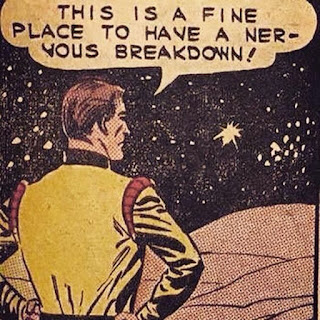The Outsider
Netflix recently released an original film, starring Jared Leto, called The Outsider. As a fan of the actor in question I was more than excited to give it a try. The trailer didn't tell much so I honestly wasn't sure what to expect other than some very Leto-esk themes and possibly being in a state of confusion through most of it. It didn't disappoint.
The film kept you in the dark from the start, something I find to be the mark of good storytelling, in the sense that it avoided exposition altogether, put you into the story and asked you to piece together the untold along the way. It's not for casual or light watching in that case. Through much of the movie you are left you scratching your head, wondering why on earth anyone is doing what they are doing, the motivations and backgrounds for the characters slowly becoming revealed and more understandable as you go. This is true for Leto's character especially - a prisoner in Japan after WWII who finds himself on the good side of a yakuza family, which he eventually joins. Even by the end of the film it's hard to say why he made the decisions that he did, but in that case it leads to intriguing amounts of interpretation; was he running from a quart marshal? Was he hiding from a daunting past? Was he a stray looking for a home? Perhaps all of the above? The discussion in and of itself is part of what makes this and many of Leto's movies so intriguing, even if they tend to a tad ridiculous.
One of the main complaints I have heard about the film, other than some finding it to be a generic Jared Leto thriller, was that the movie was "white washed" and "racist". Two more ridiculous statements could not be made. I was genuinely impressed with the historical accuracy of the setting and the very large, realistic, Asian cast. There were only five white actors in the entire film, including Leto, most of which got no more than one short scene a piece. And to complain that this film has a white actor as it's lead is to lose the entire point of the film, being that it's premise is that an American joins the yakuza during the 50's, a time in which the organization basically ruled Japan. The Asian character's were given as many if not more complexities and interest as the lead. As for it being racist the only occasions this could be seen was in a scene with a rather abrasive American slandering the Japanese people with every slang he could think of, a conversation that ended in Leto bashing his head in; it hardly glorified in any sense the American racism against Japan after the war. Otherwise the only other essence of racism was from the Japanese characters themselves, discriminating against their American associate, as well as calling him gaijin, or Outsider, as the film is named for.
All of this aside, the aesthetic was pleasing, the plot interesting, and the characters engaging. The second lead of the film, Kyoshi was often more at the forefront of the story than Nick, Jared Leto's character. He became a character that the audience could care about and wish to succeed, with traits of a brother, leader, and friend to many of the cast, while suffering disgrace and betrayal at the hands of the people he refuses to turn his back on.
WARNING! It's quite gruesome! From bashing in a man's head with a typewriter, to chopping of fingers and slitting throats, they pull no punches. It's bloody and brutal; not for light stomach's. But that's to be expected of a Netflix thriller, since there are no limits to what they can get away with.
It was an enjoyable watch and despite what the many critical reviews might say, it was a solid movie. The concept was original and, on a personal note, my new favorite thing is Jared Leto speaking Japanese.
I would be happy to see more films like this, films that can relate to an American audience with broad Asian casts and appropriate levels of historical/societal accuracy. It's not a popular opinion, but I think Netflix did well with this and I hope they produce more movies along this line.
~Revaliciousness



Comments
Post a Comment